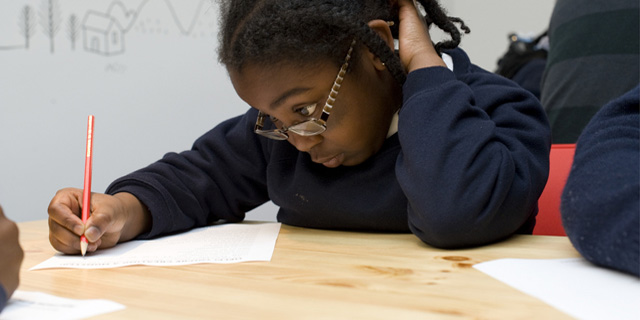With the beginning of the school year looming, now’s the time to begin preparations for a successful transition. Here’s a list of the areas to focus on when you’re getting all your kids’ ducks in a row.
- A routine
One of the most important gifts you can give your child as he or she prepares for a new school year is a schedule that includes plenty of sleep. Summer schedules tend to be more relaxed, but during the second half of August, it’s important to begin talking to your child about what bedtime means in your house. Children require different amounts of sleep, but most of them require much more than you would think. If you begin working on “the evening ritual” during the second half of August, it won’t be a shock when it really needs to be in effect.Also, if there are any issues that need to be addressed, work on them before all the other stresses of school begin: Does your child need to learn how to work an alarm clock? Do you need extra time before bed for teeth-brushing practice? Do you want to get in the habit of selecting an outfit before bed? Children perform much better in school when they are used to a routine. Create and post a list of tasks that need to be done in the evening and title it “Before Bedtime.” While you’re at it, create another list of tasks for the morning and title it “Morning Schedule.” If your child isn’t reading yet, use pictures to create the list. On at least one of those lists, please include story time. Reading with your child is not only enjoyable; it promotes intellectual curiosity in children. - Reassurance from parents
Regardless of your child’s age, a new school year brings anticipation of new friends, new teachers and new things to learn. All of that newness brings with it a certain amount of trepidation, too. In the weeks before school starts, talk first about the positive aspects of last year’s school experience. Even if it wasn’t a banner year, surely you can find something positive to say. Remember that the social aspect of school is nearly as important as the academic part. If your child made strides socially, be sure to point those out, too. Report cards don’t provide a complete evaluation of a child’s growth.After you discuss the positive aspects of last year’s experience, talk about what is likely to be different this year. For small children, you might talk about going to a different classroom and making new friends. Stress that a new teacher is going to do things differently, but that good manners and respect work well in every classroom. For older students, the reassurance from parents should take the form of, “I’m proud your accomplishments. You have talents that we want to develop, so let’s work together to set some goals.” Please don’t turn an opportunity for reassurance into a lecture. You and your child are a team, so when it’s time for reassurance, let your kids know that you will be there to help them grow into kind, responsible human beings. - A teacher who understands
Sometimes parents prefer not to communicate with their child’s teacher because they’re afraid that the teacher will form an unfavorable opinion of their child before school has begun for the year. I disagree. If you have concerns, your child’s teacher needs to know about them. The best way to approach this is to contact the school about two weeks before school starts. The week before school starts is an extremely busy time for teachers, and you’ll make points with a teacher if you’re courteous and respectful of the demands placed on them before school begins. So contact the school slightly before that week before school begins. Class rosters are usually decided by that time. Explain to the school secretary or counselor that you would like a brief meeting with the teacher prior to the beginning of school to discuss the ways that you can work together to help your child be successful this year. Also explain that you have some information that might be helpful to the teacher. Teachers appreciate helpful parents. Think of a new school year as a fresh start for everyone. Try not to bring any leftover hostility with you when you meet a new teacher. A new teacher means a new approach. If you work with a teacher rather than against her, it will benefit everyone involved, especially your student. - School supplies that “fit”
In “When Your Centerpiece is Made of Crayons and the Dog Has Eaten Your Crayons,” I wrote about the angst a parent feels when he or she sees the seemingly endless array of baby products available in stores today. A close second to that is the array of school supplies that begin to appear in stores by July. I thought we had a lot of supplies available to us in the 1980s, but now…whew, it’s enough to give a well-meaning parent a headache. (Fortunately, in many stores, the aisle containing headache remedies is located nearly adjacent to the school supplies aisle.)As funny as it seems, when parents are faced with school supplies, their eyes glaze over, and they forget the age of their student. If you repeat to yourself, “My child is ___ years old,” as you peruse the products, you’ll find that many of the products are not age appropriate for your child, and therefore you can ignore those products. Your kindergartener is not likely to need highlighter pens, and your fifth grader is not likely to need triangular crayons. Thankfully, many schools provide a shopping list of the supplies that are required for your child. If not, please buy the bare minimum. I know, everything is so shiny and the kittens on the folders are really cute, but save yourself a headache and a lot of money. Don’t buy pens for young students, be sure that scissors are age appropriate, and truly…pencils and paper are really all they will need for the first day. After that, you’ll have a better sense of what supplies are required.My suggestion to parents is that they put their hard-earned money into an excellent-quality backpack. Backpacks get quite a workout, so the more durable they are, the better. Also, children tend to try to pack everything from their bedroom into their backpack, which results in an extremely heavy backpack. Please buy a backpack that fits your child’s size. Not her age–her size. Some catalogs and websites offer size charts for backpacks. I use them every year. The key to an effective backpack is adequate pockets and well-functioning zippers. Be sure to test them before you buy, or if they’re ordered from a catalog, check the zippers before you remove any tags. One final thought on school supplies: Please put your child’s name or initials on everything that you buy. When you are in the school supplies aisle, pick up a permanent marker. That one is for you.
- Carefully chosen extracurricular activities
Children are supposed to play. When school is done for the day, they need time to process what’s happened in their day. Unstructured play strengthens the imagination and reduces stress in children. Please avoid the temptation to sign your child up for every activity that comes along. We’ve all seen the barrage of paper that comes home with students at the beginning of the year. It’s “recruiting time” in earnest. When it’s time to decide which extracurricular activities are right for your child, ask yourself, “What does my child want to do? How many days a week should my child be involved in activities? When will homework be done? When will we spend time together as a family?” Your answers to these questions are specific to you and your child. I recommend that a child (and parent) select two activities per season. Keep in mind that a child who is forced to participate in an activity is almost sure to hate it. Also keep in mind that video games and the use of earbuds do not constitute extracurricular activities. They do little to foster a healthy imagination or social skills. Placing healthy limits on non-school activities is necessary for your child’s health and success in school.
Children need balance in their lives, and it’s up to parents to create that balance. The start of a school year is a new adventure. If you approach it with optimism and ease into it by preparing in the weeks before school begins, your child is likely to view it in a positive light. Then, once school starts, be available to listen and take an interest in the tiny details that are important to your child. After all, their triumphs are yours, too.







